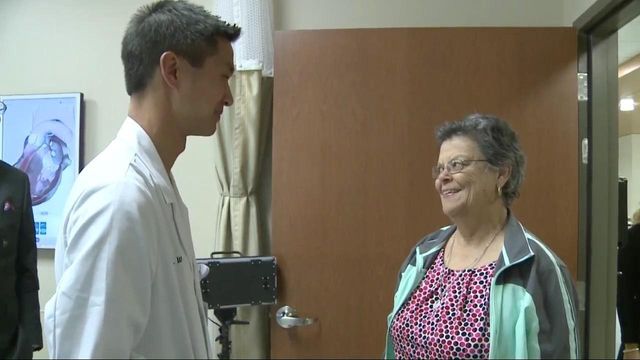New 'clip' procedure can fix heart valve problem without surgery
About 1 in 15 people over the age of 65 have mitral valve prolapse, which can become life-threatening. People with the condition now have a non-surgical option that can restore proper blood flow.
Posted — UpdatedAbout 1 in 15 people over the age of 65, though, have mitral valve prolapse, which can become life-threatening. People with the condition now have a non-surgical option that can restore proper blood flow.
"It's really the most common valve problem that we see," said Dr. Christian Gring, a Heart & Vascular cardiologist.
Gring said blood should move through the heart in one direction, but with mitral valve disease, blood can flow back the wrong way.
"That causes pressure to rise in the heart, as well as the lungs, leading to the type of symptoms like shortness of breath and heart failure symptoms," Gring said.
Colmorene Wilson, 75, of Warrenton, first met interventional cardiologist Dr. Willis Wu of North Carolina Heart & Vascular one year ago. She said was not as happy and energetic as she is now.
"I could not walk to the door without shortness of breath," Wilson said.
Imaging tests, like an echocardiogram, revealed a leaking mitral valve in her heart.
For people who need valve repair, open heart surgery is considered the best treatment, but for most older patients, like Wilson, it's too high of a risk.
At NC Heart & Vascular in Raleigh, Wilson underwent a new, non-surgical valve repair using catheter-based tools.
"It is one of the most highly sophisticated devices that we have," Wu said.
As with stenting procedures, a catheter enters through the femoral vein near the groin and reaches up to the patient's heart.
Echocardiogram imaging helps Wu find the leaking valve where he'll place a special clip.
"Essentially, we cinch that tissue together and get rid of the part that is leaking," Wu said. "We can actually repair heart valves without having to open the chest as they did traditionally in the last 20 to 30 years."
Wilson noticed the difference when she woke up after the procedure.
"Right away—I didn't use oxygen in the hospital," Wilson said.
She hasn't needed it since.
The FDA approved the new mitral valve clip system in 2013, so no one knows yet how long the clip will remain effective inside the heart.
For patients at lower risk, open surgery to repair the valve is still the preferred treatment.
• Credits
Copyright 2024 by Capitol Broadcasting Company. All rights reserved. This material may not be published, broadcast, rewritten or redistributed.





